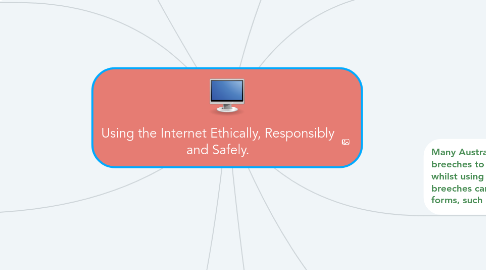Using the Internet Ethically, Responsibly and Safely.
by Paige Addis


1. What is the internet?
1.1. Emailing.
1.2. Social media networks.
1.3. Online gaming.
1.4. Search engines.
1.5. Online shopping.
2. Keeping safe at home.
2.1. Do not open suspicious looking emails, links or advertisements.
2.2. Keep all information personal and private.
2.2.1. Passwords are secret.
2.2.2. Profiles are private.
2.2.3. Sharing and viewing settings are restricted.
2.3. Do not meet up with anyone from the online world unless you know them in reality.
2.4. Speak to someone if you experience a breach in internet safety or trust.
2.5. For more information, visit here.
3. Ethical use of internet sources.
3.1. Understanding Copyright and Creative Commons laws.
3.2. Crediting creators and citing websites.
3.3. Stay within expectations and internet guidelines.
4. Being a critical user of the web.
4.1. Evaluate resources.
4.2. Are they trust worthy and reliable?
4.3. Who is the author and what are their credentials?
4.4. What is the purpose?
5. In developing and acting with ICT, students should:
5.1. Apply personal security protocols.
5.2. Apply digital information security practices.
5.3. Recognise intellectual property.
5.4. Identify the impacts of ICT in society.
5.5. For more information, visit here.
6. Many Australians experience breeches to their online safety whilst using technology. These breeches can come in many forms, such as:
6.1. Image based abuse i.e. sexual images being distributed without consent.
6.1.1. Watch 15 year old Dee's experience with image based abuse here.

